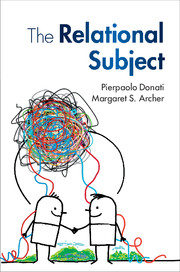Book contents
- Frontmatter
- Dedication
- Contents
- List of figures
- Acknowledgements
- Part I
- Part II
- Part III
- Prologue: The range of Relational Subjects: where and how they emerge
- 6 When Relational Subjects generate relational goods
- 7 The emergence of collective Relational Subjects and their societal impact: beyond the market/state binary code
- 8 Relational Subjects and the ravages of globalized markets: the need for subjects with relational ethics
- 9 Conclusions: Collective subjects and the added value of social relations
- Index
7 - The emergence of collective Relational Subjects and their societal impact: beyond the market/state binary code
from Part III
Published online by Cambridge University Press: 05 July 2015
- Frontmatter
- Dedication
- Contents
- List of figures
- Acknowledgements
- Part I
- Part II
- Part III
- Prologue: The range of Relational Subjects: where and how they emerge
- 6 When Relational Subjects generate relational goods
- 7 The emergence of collective Relational Subjects and their societal impact: beyond the market/state binary code
- 8 Relational Subjects and the ravages of globalized markets: the need for subjects with relational ethics
- 9 Conclusions: Collective subjects and the added value of social relations
- Index
Summary
Why the recurrent worldwide economic crises?
Do the recurrent worldwide economic crises have a sociological explanation?
The world crisis of the financial economy that broke out in September 2008 – first in the USA and then in Europe – has been interpreted in many different ways, though mostly from a strictly economic point of view. Basically, the crisis has been attributed to a ‘malfunctioning’ of financial markets, obviously widely resorting in the process to moral considerations concerning economic actors failing to behave ethically. Solutions have been seeking to identify new rules capable of moralizing markets.
Politics has been assigned the task of finding practical solutions, that is, measures to be implemented by national States and formulated by international agreements among States. International monetary authorities have been called upon by governments to act as fire brigades (i.e. to bail out banks and financial agencies from bankruptcy). Governments have adopted measures to limit the crisis's effects on unemployment as well as increases in national poverty rates.
We still lack a sociological interpretation of the crisis per se, differing from interpretations centred upon economic, political, and moral factors. Certainly many sociologists have provided sound analyses of the crisis, but their explanations have focussed mainly upon the interplay between the economic and political systems, without comprehending the very social features of the crisis. Other sociologists, for instance the supporters of the so-called theory of ‘reflexive modernization’, have dealt with the crisis in an abstract way, that is, as a historical stage in which modernization radicalizes itself, turns onto itself, and becomes a problem to itself.
Sociological analyses have often been confused with moral ones. Take, for instance, the proposals regarding a new economy with a ‘human face’, drawing economic behaviour from philosophical anthropology (in particular from a ‘personalistic’ anthropology rooted in both Catholic and Islamic thought).
- Type
- Chapter
- Information
- The Relational Subject , pp. 229 - 262Publisher: Cambridge University PressPrint publication year: 2015

